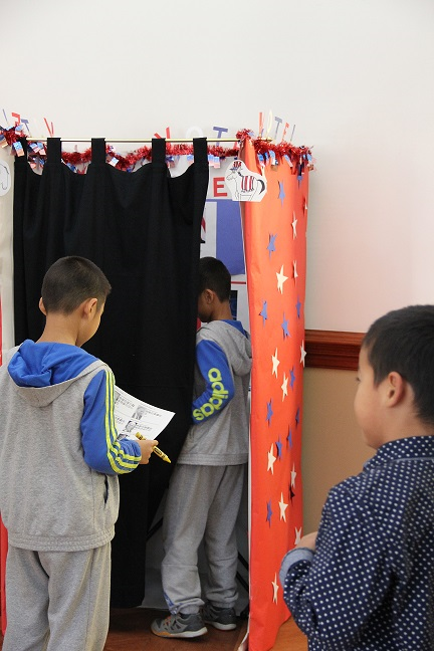Election Year at the Library

On Election Day 2016, hundreds of children, many of them first time voters, lined up at the City of Fairfax Regional Library in Virginia to cast ballots. Staff built a kid-size voting booth adorned with stars and stripes, with a curtain for privacy. Only people under 17 were eligible; photos of presidential candidates were provided for the pre-literate. “Since some voters needed parental guidance, the balloting was not entirely secret,” quips Karen Jakl, Youth Services Assistant. After participating, each child received an ‘I Voted’ sticker. The booth re-appeared for a local election- this time with superheroes competing to “lead the library.” It will re-emerge for the 2020 presidential election, giving kids a chance to learn about the voting process and participate in the excitement of Election Day.

The Town and Country Public Library in Illinois has a similar event for both kids and teens. Children vote for their favorite cookie, and teens vote for their favorite pizza. “The library gave out samples of the cookie and pizza that won these junior elections,” reports Roving Reference Librarian Dwayne Nelson.
While no advance registration was needed for these kid-friendly events, millions of adults find out too late that they missed a deadline to register or update their information before Election Day. Some proactive libraries are promoting National Voter Registration Day with programs and displays. The holiday celebrating democracy occurs the fourth Tuesday of September each year.
Madison Public Library in Wisconsin partnered with Local Voices Network prior to their last mayoral election to collect information about concerns of citizens. The program utilized digital hearths to record over 60 discussions and convey perspectives of diverse community members to candidates, policymakers and the media.
Central Rappahannock Regional Library in Virginia conducted a “Speed Repping“ event in which “state assembly candidates were invited to speak with the public in a speed-dating style setting,” according to Tracy McPeck, Adult Services Coordinator. The event was in partnership with League of Women Voters Fredericksburg Area (LWVFA) and other local groups. They also partnered with LWVFA on ‘Civic Lab: Dear Elected Official’, which McPeck describes as “informal lobby tables that engage passersby in discussions on where to vote and how to contact their legislators.”
Many libraries create LibGuides for voters, such as Be A Voter, developed by Reference Librarian Haley Samuelson and colleague Nate Gass of Cook Memorial Public Library District in Illinois: “Our goal was to create a one stop shop for the entire voting process. We are located in a deep purple district and have been pleased that patrons of all political stripes have found the resource useful and neutral,” Samuelson reports.
Young voters tend to be least likely to turn out on Election Day. Matt Imrie creates an interactive display to raise awareness. “I have a display in my teen area encouraging young people to register and have a rotating display of books, a weekly countdown, and a random political term with what it means written in plain English,” explains the Youth Information Specialist for the Gardner Branch of the Johnson County Library in Kansas.
Public libraries often serve vulnerable members of the community, including survivors of domestic violence, whose barriers to voting may include privacy concerns. Miranda Dube, who maintains the Librarians for Survivors website, explains how to help: “Libraries can make sure they provide information on how voting records are public as many survivors may be unaware of the risk of registering to vote. Make sure information about local Address Confidentiality Programs (ACPs) are available.” ACP and Confidential Voter Listings are state-administered programs that enable survivors of domestic violence to vote using a substitute address. The National Network to end Domestic Violence maintains a state-by-state list of such programs.
Lack of a permanent address can be a voting obstacle for people experiencing homelessness. You Don’t Need a Home to Vote toolkit, produced by the National Coalition to End Homelessness, includes tips and a chart of state voter regulations. Nonprofit Votes helps nonprofits engage members in voting and elections, including a starter kit and checklist for remaining nonpartisan.
Wondering who won the kids’ vote at the City of Fairfax Regional Library? Let’s just say the kids didn’t agree with the Electoral College results in 2016, but aligned with adult voting results for the county. And in the local election, Marvel Superheroes beat DC Comics’ team by just 12 votes- proving that every vote counts!
Tags: election day, election year at the library, i voted, junior election events, smart voting at the library, voter information at the library, voter registration at the library












